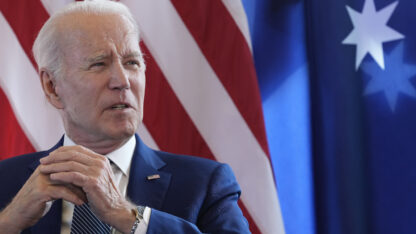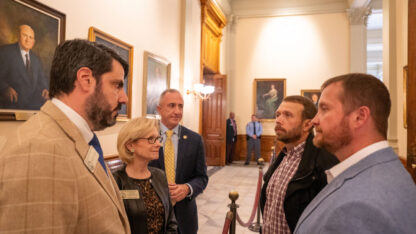Trailing Trump, DeSantis still bears burdens that have brought down past frontrunners
It may seem odd to describe a presidential candidate as a frontrunner when a rival candidate is outpolling him by more than 2 to 1.
But that’s what Florida Gov. Ron DeSantis faces in the 2024 election cycle. He is decidedly an underdog to former President Donald Trump in all recent polls. Yet he is just as clearly the leading alternative to Trump, should Republicans find they need one – or decide they want one.
In the unique circumstances of the 2024 presidential cycle, that makes DeSantis a species of frontrunner, de facto — because the gap between him and his closest competition in the GOP is nearly as great as the gap between him and Trump.
If his current poll standing makes him the first choice of just one Republican in four, he is still the second choice of half the party. The other declared candidates – Tim Scott, Nikki Haley, Asa Hutchinson, Vivek Ramaswamy – are still largely introducing themselves. And Trump’s vice president, Mike Pence — as-of-yet undeclared in the race — has a base of evangelical supporters but has shown little or no upside potential.
But being clearly the party’s Plan B right now might not be good news for DeSantis. It also makes him Target A for Trump and for all the other candidates. The also-rans will bid for attention by attacking him. Few if any will want to risk tangling with Trump, but will any of them fear a fracas with DeSantis? The latter may look like a ticket to greater visibility on cable and in social media.
And speaking of media, the special attention that news people have focused on frontrunners in the past has proven fatal to more than a few. DeSantis already has a fraught relationship with many in the mainstream media, who will pounce on any and all missteps by DeSantis. We got a glimpse of that in the glee that greeted his abortive announcement of his candidacy on Elon Musk’s Twitter launchpad.
Examples of past frontrunners litter the landscape
We need not go far back in electoral history to find examples of frontrunners and other highly regarded contenders who never lived up to their early billing.
The most egregious case in recent cycles was surely that of Jeb Bush, another Florida governor who used his record in that office to boost his credentials for national office.
Bush, whom some considered more talented than his brother (George W.) or their father (George H.W.), had been out of office since 2007 but was still regarded as the presumptive frontrunner when he announced in 2015. He led in the early polling and raised his first $100 million almost overnight.
Yet when the campaigning began, Jeb Bush seemed oddly ill at ease and out of gas. He did not know how to handle Trump in the televised debates – as indeed no one did.
“Donald, you’re not going to be able to insult your way to the presidency. That’s not going to happen,” he said at the time, even as Trump was clearly doing so.
Through the long pre-primary months of 2015, Bush descended in the polls as Trump rose. And when the voting began in Iowa on February 2016, Bush finished sixth, barely ahead of former high-tech executive Carly Fiorina. Eight days later Bush was fourth in New Hampshire and it was over. He officially ended his campaign on Feb. 20.
Almost as stunning was the descent of former New York Mayor Rudy Giuliani in the Republican primaries of 2008. When Sen. John McCain of Arizona had campaign problems in 2007, Giuliani, “America’s Mayor” after the terror attacks of Sept. 11, 2001, emerged as a frontrunner. It did not hurt that so many major media organizations had their headquarters in Manhattan.
At a fundraising event for the Hoover Institution on the campus of Stanford University in October of 2007, the speaker for the evening asked for a show of hands in support of the various Republican candidates for president. There were some hands up for McCain, also a few for former governors Mitt Romney and Mike Romney. But when it came to Giuliani, there were too many hands to count. It was a forest of hands.
At the time, there was almost as great a presumption that the Democratic nominee in 2008 would be New York’s Sen. Hillary Clinton. She dominated the national polling in most of 2007 in a field of eight. But in the Iowa caucuses on Jan. 3, 2008, she finished third – well behind the winner, Barack Obama. Clinton made a comeback in the New Hampshire primary and won most of the top 10 populous states’ primaries that year, but Obama won more states and more delegates.
Clinton would return to presidential politics eight years later, looking inevitable enough that only a few other candidates entered the lists against her even briefly. But one of those few, Sen. Bernie Sanders of Vermont, gave Clinton a real contest. His campaign rallies rivaled Trump’s for populist fervor, and Sanders arrived at the national convention with nearly 40% of the delegates. Whether Sanders weakened Clinton as a candidate or revealed her vulnerability, it was another case of a frontrunner struggling to finish.
“The Scream” and the dream
There have also been a number of other presidential hopefuls who may not have been clear frontrunners but appeared at least competitive before the voting began. These would include Howard Dean, a former governor of Vermont who in 2003 was the first major candidate to organize and campaign extensively on the internet.
He rose steadily in the polls and rode a groundswell of popular support into the Iowa caucuses that year, but finished third there. His concession speech that night ended with a hoarse roar that became known as the “Dean scream,” and he fell to second in the New Hampshire primary shortly thereafter. He later served as chair of the Democratic National Committee.
In November of 1991, polls in New Hampshire showed the leading Democratic candidate for 1992 was New York Gov. Mario Cuomo, who was 20 points ahead of the field. Cuomo had given a rousing keynote speech at the national convention in 1984 and won reelection as governor in 1986 by more than 30 points.
But the problem was that Cuomo was not actually running. He waited until the filing deadline just before Christmas that year, then backed off again. National party officials begged him to run, and a draft movement began. But he closed it down.
Party officials had also besieged Cuomo four years earlier to run in the 1988 cycle, when the party’s early frontrunner quit the race 10 months before the Iowa caucuses. That early frontrunner, former Colorado Sen. Gary Hart quit when confronted with newspaper stories about an extramarital affair. (It was an episode detailed in the 2018 Jason Reitman film “The Frontrunner” starring Hugh Jackman.)
Astronauts and other big names have not been immune
Hart had been the runner-up in 1984 in a large field of Democrats who wanted the chance to take on incumbent Republican President Ronald Reagan. The leader early on in fundraising and polls that cycle was Sen. John Glenn of Ohio, a military hero and one of the original U.S. astronauts.
Glenn had the kind of moderate profile observers thought would fare best against Reagan, and he polled better against incumbent. Glenn had opened offices across the country and was running TV ads in Iowa before the caucuses there. But when caucus night came, Glenn finished a stunning fifth. Unable to recover in New Hampshire, he was out of the race by mid-March.
At the beginning of the 1980s, before that decade became known as the Age of Reagan, incumbent President Jimmy Carter entered his reelection year worrying first and foremost about a challenger in his own party. That challenger was Ted Kennedy, still in the first half of his almost 47-year career as a senator from Massachusetts. The brother of the assassinated President John F. Kennedy and also of assassinated presidential candidate Robert F. Kennedy, the youngest of the brothers had himself been considered a frontrunner for the party’s nomination in 1972 before a young woman on his staff drowned in a car he had driven off a bridge in 1969.
Kennedy came back to serve with distinction in the Senate, declining to run for president in 1972 or 1976 before deciding to challenge Carter for the 1980 nomination. But after the seizing of the U.S. embassy in Tehran by revolutionaries and the holding of 52 American hostages there, Kennedy’s bid faded and Carter won re-nomination relatively easily.
In that same cycle, former Texas governor and Treasury Secretary John Connally began the pre-primary season as a big favorite among Republican donors and activists. But his imperial air did not sell well in Iowa, where he got just 9 percent and finished far behind George H.W. Bush, who won Iowa that year, and Reagan. But it would be Reagan who beat Connally and Bush in the New Hampshire primary, going on from there to dominate the remaining primaries — and the politics of the nation for the rest of the decade.
9(MDAxODM0MDY4MDEyMTY4NDA3MzI3YjkzMw004))








